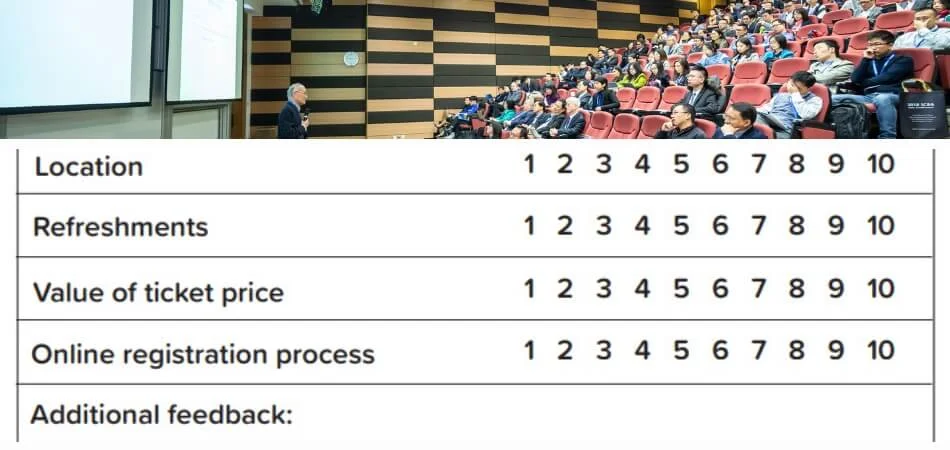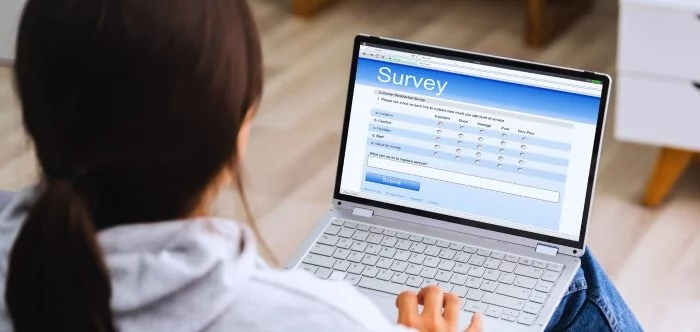In the dynamic world of conferences, where ideas converge and networking thrives, understanding how to gather and use attendee feedback is essential. You might be wondering, “What is a conference survey?” This is a crucial tool that allows event organizers to capture valuable insights from participants.
A conference survey is a structured tool designed to collect feedback from attendees after an event. It typically includes a series of targeted questions aimed at assessing various aspects of the conference, such as content quality, speaker effectiveness, and logistical arrangements. The insights gained help organizers make informed decisions for future events.
Are you curious about how to create an effective conference survey? In this article, you will find all the necessary information to guide you through the process, ensuring your next event is even more successful.
The Significance of Survey in Any Sector?
Across various sectors, surveys offer valuable insights and guide decision-making. They are tools for gathering data, opinions, or feedback through a series of questions. This process allows organizations to make informed choices, understand trends, and address specific issues.
- In market research, surveys reveal consumer preferences, driving product development to meet market demands effectively. They also track brand perception, helping companies adjust their marketing strategies for better engagement.
- In healthcare, patient surveys provide critical feedback on care quality, influencing improvements in treatment and patient experience. These insights assist in policy formulation, ensuring healthcare practices align with patient needs and expectations.
- Within education, surveys assess teaching methods and student satisfaction, guiding curriculum development and teaching strategies. They also gather feedback from alumni, aiding in the enhancement of educational programs and services.
- In employee engagement, surveys identify staff satisfaction and areas needing improvement, fostering a positive workplace culture. They also gauge employee perceptions of management practices, leading to enhanced leadership and communication strategies.
- For government policy-making, surveys gauge public opinion on various issues, shaping policies that reflect citizens’ needs and concerns. They also provide a platform for civic engagement, strengthening the relationship between governments and their constituents.
- In customer service, surveys evaluate customer satisfaction, pinpointing areas needing improvement for enhanced service quality. This feedback helps tailor services to meet customer expectations, ensuring loyalty and repeat business.
- Surveys are crucial in extracting valuable information, shaping strategies, and driving progress in all sectors. They bridge the gap between what is and what could be, creating growth and innovation. As tools of exploration and discovery, their significance cannot be overstated.
What is a Conference Survey?
In event planning, gathering audience feedback is essential for shaping future gatherings. A well-designed survey provides actionable insights, driving continuous improvement. Utilizing this feedback transforms attendee experiences, improving the success of your event.
Defining the Purpose of the Survey
The first step in creating an effective conference survey is to define its purpose clearly. Are you looking to assess the overall success of the event, or do you need feedback on specific sessions and speakers? Understanding the goals of your survey will guide the questions you ask and ensure that the data you collect is relevant and useful.
Developing Targeted Questions
Effective surveys are built on well-crafted questions. These should be clear, concise, and aligned with the survey’s objectives. Consider using a mix of multiple-choice questions, rating scales, and open-ended questions to capture a wide range of insights. Each question should contribute to the overall goal of making the survey meaningful, allowing organizers to draw clear conclusions from the responses.
Timing of the Survey
Your survey’s timing can have a significant impact on the quality of the feedback you receive. Pre-event surveys can measure expectations and help personalize the event to attendees’ needs, while post-event surveys capture immediate reactions. Additionally, follow-up surveys conducted weeks after the event can provide insights into long-term impacts and overall satisfaction. Choosing the right timing ensures that your survey is both relevant and impactful.
Ensuring Broad Participation
To get the most out of your conference survey, it’s important to encourage broad participation. Communicate the importance of the survey to attendees and make it as accessible as possible. Offering incentives, such as early access to event materials or entry into a prize draw, can increase response rates. The more responses you collect, the more accurate and actionable your insights will be.
Analyzing the Data
Once you’ve collected the responses, the next step is to analyze the data. Look for trends, patterns, and outliers that can inform your decisions. It’s important to categorize feedback and prioritize areas that need the most attention. Whether it’s improving session content or improving logistical arrangements, the data should guide your actions.
Implementing Changes Based on Feedback
The final and most critical step in the survey process is to implement changes based on the feedback received. This might involve refining content, adjusting logistics, or rethinking aspects of the event structure. Taking action on the insights from the survey shows attendees that you value their feedback and are committed to improving their experience.
In addition to providing feedback, actionable conference survey are powerful tools for advancing the organization. Your survey can resonate with your audience if you design it carefully, time it appropriately, and act upon the information you gather. To succeed, you need to listen to your attendees and take their insights into account.
The Core Purpose of Survey at the Conference
At conferences, surveys are used primarily to engage attendees and collect valuable feedback. These surveys enable organizers to gain insights into participant satisfaction, identify areas for improvement, and refine future events.
By using reader-friendly questionnaires, event planners can gauge attendees’ preferences, from session topics to logistical arrangements. This valuable information helps organizers tailor upcoming conferences to better suit participants’ needs and expectations.
Furthermore, these surveys aim to enhance the overall conference experience. By listening actively to attendees’ opinions and suggestions, organizers can create more meaningful and enjoyable events, fostering a sense of community and satisfaction. As part of this process, understanding the primary role of conferences in professional development and networking is essential.
What are the Components of a Conference Survey?
A well-structured conference survey comprises several essential components that collectively ensure effective data collection and analysis. Here are the key components to include:
- Clear Objectives: Define the survey’s purpose and what specific insights you aim to gather. This clarity guides question formulation and data interpretation.
- Targeted Questions: Develop concise and relevant questions that align with your objectives. Use a mix of multiple-choice, open-ended, and rating scale questions.
- Analyze of Sessions and Speakers: Assess session content, speaker effectiveness, and relevance to gauge attendee satisfaction and identify areas for improvement.
- Logistics and Facilities: Gather feedback on event logistics, such as venue, registration process, and facilities, to enhance the overall attendee experience.
- Open-Ended Comments: Provide space for attendees to share additional comments or suggestions, allowing for in-depth insights and actionable feedback.
- By combining these components, organizers can gather valuable data and improve future events effectively through a comprehensive conference survey. In order to make these surveys comprehensive and actionable, conference delegate provide a variety of perspectives.
Different Types of Conference Surveys
The conference survey is a versatile tool that can be tailored to meet specific conference objectives and gather diverse insights to fine-tune the conference experience. They allow organizers to collect feedback, uncover attendee expectations, and evaluate event impact. Various types of conference surveys exist, each with its purpose:
Post-Event Satisfaction Surveys
These surveys delve into attendee satisfaction levels regarding various aspects of the conference, such as keynote speakers, workshops, venue, and networking opportunities. They provide valuable feedback that helps organizers identify strengths and weaknesses, enabling them to refine future events.
Pre-Event Expectation Surveys
Designed before the conference, these surveys aim to understand attendees’ expectations and preferences. Organizers can use this data to customize the event, ensuring it aligns with participant desires and maximizes engagement.
Session Feedback Surveys
This survey is designed to provide feedback on the quality, relevance, and impact of presentations during specific sessions or workshops. Attendees can rate speakers and topics, it provides suggestions for improvement.
Net Promoter Score (NPS) Surveys
Participants are categorized as promoters, passives, or detractors, providing organizers insight into overall satisfaction and advocacy potential. NPS surveys measure attendee loyalty by asking one key question: “How likely are you to recommend this conference to others on a scale of 0-10?”
Post-Conference Follow-Up Surveys
Sent after the event, these surveys capture long-term impressions. They assess how the conference contributed to attendees’ professional growth, networking opportunities, and ongoing learning needs. This data informs decisions for future conferences and content development.
Sponsor and Exhibitor Surveys
The role of sponsors and exhibitors in conferences is crucial. Surveys targeting them gather feedback on their experience, ROI, lead generation, and suggestions for enhancing their involvement in future conferences. This feedback is crucial for maintaining strong partnerships.
These different types of conference surveys help organizers learn what attendees like, what needs improvement, and how satisfied they are. When used well, surveys help make conferences better and meet attendees’ changing needs and expectations.
Why Are Conference Surveys Matters in Conference Settings?
With conference settings changing so rapidly, conference surveys become indispensable tools, extending beyond mere data collection. Conference surveys are the compass that guides organizers to excellence. Here’s why they matter:
Increasing Attendee Satisfaction
Conference surveys are the pulse-check for attendee contentment. They uncover what resonates with participants, from keynote speakers to workshop topics, helping organizers focus on elements that elicit satisfaction.
Customizing Content and Sessions
By delving into attendee preferences and expectations, surveys allow organizers to curate conference agendas that are not only timely but also deeply resonant. This strategic alignment keeps attendees engaged and invested.
Improving Logistics and Facilities
The lack of logistics and errors of the venue can mar an otherwise outstanding conference experience. Surveys shed light on these pain points, guiding organizers to iron out wrinkles in registration processes, facilities, and overall event operations.
Increasing Engagement and Inclusivity
Surveys aren’t just about data collection; they’re about making attendees feel heard and valued. When participants have a voice through surveys, it creates a sense of community and ownership, enhancing their commitment to the conference.
Measuring Event Success
Numbers don’t lie, and surveys provide quantifiable data to evaluate the success of a conference. Metrics like Net Promoter Scores (NPS) and participant feedback offer valuable insights, enabling organizers to gauge their event’s impact and growth.
Surveys help ensure these gatherings meet the needs and expectations of all participants, with the primary role of conferences being to bring together like-minded individuals, serving as vital compasses that guide organizers in navigating the complex landscape of conference settings.
 Conference Survey- How to Do it Properly?
Conference Survey- How to Do it Properly?
In the dynamic landscape of conference planning, mastering the art of the conference survey is vital for organizers seeking to deliver exceptional events. Here’s a detailed, step-by-step guide to conducting surveys effectively and unlocking their full potential:
Step-1. Define Your Objectives
Start by pinpointing the precise goals of your survey. Determine if you want to measure attendee satisfaction, assess specific session feedback, or gather insights on logistical aspects. Clarifying objectives sets the stage for effective survey design.
Step-2. Design Thoughtful Questions
Prepare questions with precision and relevance. Employ concise, unbiased language and ensure questions align with your objectives. Utilize a variety of question formats – multiple-choice, open-ended, and rating scales – to capture a comprehensive range of insights.
Step-3. Determine the Timing
Strategically plan when to deploy the survey. Pre-event surveys allow you to gauge attendee expectations, shaping the conference content accordingly. Post-event surveys capture immediate impressions, while follow-up surveys measure the conference’s long-term impact.
Step-4. Select a User-Friendly Platform
Choose a survey platform that’s user-friendly, responsive across devices, and offers robust analytics. Ensure that it can handle the distribution and collection of survey responses efficiently. Test the survey for usability and accessibility.
Step-5. Promote Participation
Actively encourage attendee participation by highlighting the significance of their feedback. Highlight how their input drives meaningful improvements in future conferences. Consider offering incentives like early access to conference materials or exclusive content.
Step-6. Analyze and Act on Feedback
Once data is collected, conduct a thorough analysis. Identify trends, patterns, and outliers in the responses. Categorize feedback to prioritize areas for improvement, whether it’s related to content quality, logistical efficiency, or attendee engagement.
Step-7. Communicate Results and Implement Changes
Share survey results transparently with attendees and stakeholders. Communicate the changes and enhancements planned based on their feedback. This not only shows responsiveness but also builds trust and loyalty among participants.
By sticking to these detailed steps, you can harness the full potential of conference surveys, using them as dynamic tools for continuous improvement. This approach ensures that your events evolve in response to attendee feedback, resulting in more satisfying and engaging experiences.
Frequently Asked Questions
Understanding what a conference survey is and how it works can significantly improve the success of your event. These FAQs provide clear answers to common questions, helping you grasp the importance and application of conference surveys in planning and improving your conferences.
How Does a Conference Survey Collect Attendee Feedback?
A conference survey collects attendee feedback through a series of targeted questions designed to assess various aspects of the event. Attendees typically answer questions related to session content, speaker effectiveness, and logistical arrangements, providing organizers with valuable insights.
Why Is Anonymity Important in Conference Surveys?
Anonymity in conference surveys encourages honest feedback from participants. When attendees know their responses are confidential, they are more likely to share candid opinions, which leads to more accurate and useful insights for organizers.
Can Conference Surveys Be Customized for Different Events?
Yes, conference surveys can be customized to suit the specific needs of different events. Organizers can tailor the questions to focus on particular areas of interest, such as session content, networking opportunities, or overall event logistics, ensuring the survey captures relevant data.
What Role Do Open-Ended Questions Play in Conference Surveys?
Open-ended questions in conference surveys allow attendees to provide detailed feedback in their own words. This type of question is crucial for capturing nuanced insights and suggestions that may not be covered by standard multiple-choice or rating scale questions.
How Can Survey Results Influence Future Conferences?
Survey results provide actionable data that can influence various aspects of future conferences. Organizers can use the feedback to improve session content, refine logistical arrangements, and enhance overall attendee experience, ensuring that each event is better than the last.
Bottom Line
Conference surveys are essential tools for gathering valuable feedback from attendees, enabling organizers to make informed decisions that enhance future events. By asking the right questions and analyzing the responses, you can continuously improve the quality of your conferences. Ultimately, this process helps you understand “What is a conference survey?”A powerful tool for collecting insights and driving event success.
As you move forward with planning your next event, remember to design your surveys with clear objectives, ask a mix of questions, and encourage participation for the best results. Best wishes on creating successful and impactful conferences that leave a lasting impression on your attendees!








